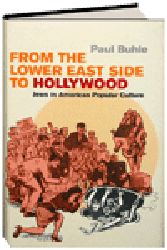For many, Sid Caesar was America’s ultimate comedian; younger generations may not even recognize his name. Somehow Margolick offers both the cognoscenti and the newbies a satisfying examination of the man’s life and career.
An awkward, tongue-tied boy, Sid Caesar grew up in working-class Yonkers, helping out in his parents’ luncheonette. Learning to play a saxophone left by a deadbeat renter led to him performing on the Borsht Belt, where he soon turned to comedy. After World War II, television was the big new thing, which meant that there was a huge demand for live talent. Before long, people were buying TVs just to watch Sid on Your Show of Shows every Saturday night.
Sid’s comedy was cerebral and animated and sometimes complete gibberish — but hilarious. It was also — to those in the know — very Jewish. It wasn’t that his writers were all Jewish, although they usually were. The jokes certainly didn’t mention Jewish things, like bar mitzvahs or rabbis. No, what made this comedy Jewish was the anger the writers were holding in. Whether they’d lost family in pogroms or the Holocaust, or served in the armed forces in World War II, they looked at fifties America and saw the antisemitism just under the surface. And as Mel Tolkin, one of Sid’s writers put it, “humor becomes anger made acceptable with a joke.”
It’s anger that’s the unexpected twist of this book. When you sit down to read about the life of the country’s greatest comedian, you expect funny stories, lots of laughs. Instead you discover a man with two speeds — “coma and frenzy.” In his peak years on television, Sid Caesar worked at least six days a week and expected his writing crew to do likewise. A huge man who waved around loaded guns and ate and drank enough for ten people, Sid was a workaholic and an alcoholic.
On one level, this the story of many performing artists: working furiously until the career peaks, then breaking down when the audiences move away. But Sid’s career was shaped by television. When he began, people performed live; shows weren’t taped and aired later. There were no laugh tracks. There were few internal or external censors dictating when a routine “crossed the line.” And while their routines may have looked spontaneous, in fact they were argued and rehearsed over and over before they hit the stage (except Saturday Night Live, which dismayed Caesar when he hosted it). Shaped by live television, Caesar couldn’t easily pivot into film. And in ten short years, as Margolick puts it, television went from wildly innovative to the “playing it safe” stage. There was no room for wacky anymore.
As inevitable as Sid Caesar’s decline may have been, it still makes for wrenching reading. Before starting the last chapter of this marvelous book, line up some Sid Caesar routines to watch on YouTube. They’ll be your show of shows.
Bettina Berch, author of the recent biography, From Hester Street to Hollywood: The Life and Work of Anzia Yezierska, teaches part-time at the Borough of Manhattan Community College.





